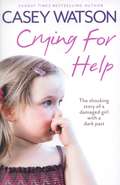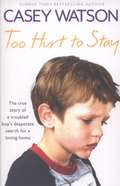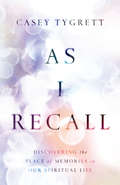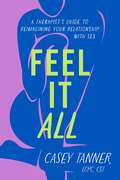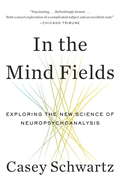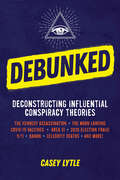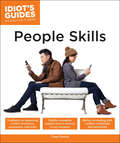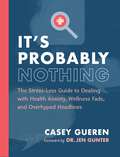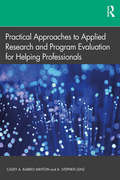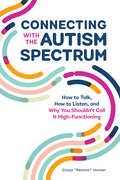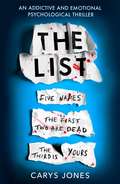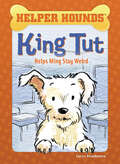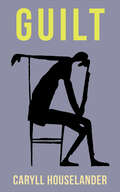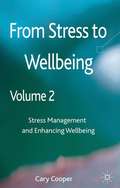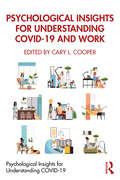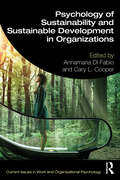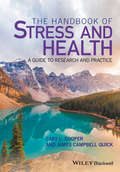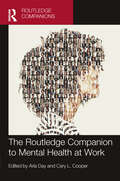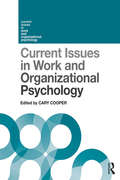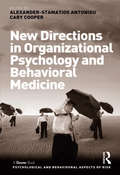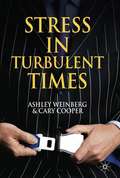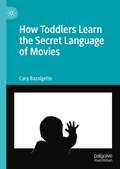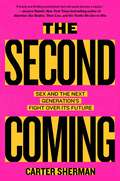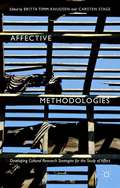- Table View
- List View
Crying for Help: The Shocking True Story of a Damaged Girl with a Dark Past
by Casey WatsonThe second book from Sunday Times bestselling author Casey Watson. Two weeks after saying farewell to her first foster child, Casey is asked to look after Sophia, a troubled 12-year-old with a sad past. Sophia s actions are disturbing and provocative and, before long, Casey and her family find themselves in a dark and dangerous situation. Two years ago Sophia s mother had a terrible accident. Sophia has been in care ever since. Right away, Casey feels something isn t right. Sophia s a well-developed girl, who looks more like 18 than 12. She only seems to have eyes and ears for men, and treats all women with contempt and disgust. And she has everyone around her jumping through hoops. Over time, as more details begin to emerge about Sophia s past, it becomes clear that her behaviour is a front for an early life filled with pain and suffering. But although Casey feels she is gradually breaking through to Sophia and getting her to open up about things she has never spoken about before, her violence is threatening the safety of the whole family, forcing Casey to question whether she can really handle this lost and damaged girl. Both shocking and inspiring, this true story will shed new light on the extreme and sometimes dangerous nature of foster care. "
Too Hurt to Stay: The True Story of a Troubled Boy's Desperate Search for a Loving Home
by Casey WatsonEight-year-old Spencer takes himself to social services and demands to be taken into care.Casey is determined to try and understand what Spencer is going through and help him find the loving home he is so desperately searching for.
As I Recall: Discovering the Place of Memories in Our Spiritual Life
by Casey TygrettWhat if our memories are like shells we gather on a beach? According to pastor and spiritual director Casey Tygrett, "We—and all those who have come before us—pick up the experience and we sense it: we feel its edges, notice its color, we smell the distinctive character (for shells it is the sickly seafood salt smell) of the experience and we try to make sense of what it is. Is it beautiful? How would you describe the color—the tones, the shades, wrapped around the ridges and swirls? Has it been damaged? Does the hard edge scrape our hand, leaving a blemish or a mark?" How we hold and carry these memories—good and bad—is a part of what forms us spiritually. In this way we have a common bond with the people of Scripture who also had a sensory life, gathering shells and trying to make sense of them. In these pages Casey Tygrett explores the power of memory and offers biblical texts and practices to guide us in bringing our memories to God for spiritual transformation.
Feel It All: A Therapist's Guide to Reimagining Your Relationship with Sex
by Casey TannerA groundbreaking guide to sexuality that dispels the stale cultural attitudes about sex that leave too many feeling inadequate, and offers an expansive, attachment-based framework to free us and develop bolder, more satisfying relationships with our sexual selves.When it comes to sex, most people feel insecure. But it’s not because we’re deficient; it’s because we’ve been under-resourced and miseducated. Certified sex therapist Casey Tanner argues that our sex lives are a microcosm of every untruth we’ve internalized about gender, sex, relationships, our bodies, and ourselves. Most of us were taught that healthy sexuality is only for a certain kind of person, in a certain kind of relationship, with a certain kind of body. As a result, the way we’ve learned how to define “good sex” is reflective of how good, worthy, and loveable we see ourselves.Feel It All is a comprehensive guide to help everyone uncover their personal misconceptions about sexuality and relationships. Tanner helps you recognize and assess your core beliefs surrounding relationships, sexuality, gender, and more; identify past trauma; find pathways to healing that work for you; and redefine sex based on knowledge and possibilities, rather than potential consequences.Comprehensive yet accessible, informative, warm, and nonjudgmental, Feel It All provides a pathway for personal healing, creating stronger relationships, and achieving deeper intimacy.
In the Mind Fields
by Casey Schwartz"Everywhere I looked it seemed that we were being defined by what our brains were doing . . . Everywhere, there were hucksters and geniuses, all trying to colonize the new world of the brain." "I'd never been a science person," Casey Schwartz declares at the beginning of her far-reaching quest to understand how we define ourselves. Nevertheless, in her early twenties, she was drawn to the possibilities and insights emerging on the frontiers of brain research. Over the next decade she set out to meet the neuroscientists and psychoanalysts engaged with such questions as, How do we perceive the world, make decisions, or remember our childhoods? Are we using the brain? Or the mind? To what extent is it both? Schwartz discovered that neuroscience and psychoanalysis are engaged in a conflict almost as old as the disciplines themselves. Many neuroscientists, if they think about psychoanalysis at all, view it as outdated, arbitrary, and subjective, while many psychoanalysts decry neuroscience as lacking the true texture of human experience. With passion and humor, Schwartz explores the surprising efforts to find common ground. Beginning among the tweedy Freudians of North London and proceeding to laboratories, consulting rooms, and hospital bedsides around the world, Schwartz introduces a cast of pioneering characters, from Mark Solms, a South African neuropsychoanalyst with an expertise in dreams, to David Silvers, a psychoanalyst practicing in New York, to Harry, a man who has lost his use of language in the wake of a stroke but who nevertheless benefits from Silvers's analytic technique. In the Mind Fields is a riveting view of the convictions, obsessions, and struggles of those who dedicate themselves to the effort to understand the mysteries of inner life.From the Hardcover edition.
Debunked EBK: Separate the Rational from the Irrational in Influential Conspiracy Theories
by Casey LytleHead down the rabbit hole and feed your fascination for conspiracy and controversy. Conspiracy theories-they're influential and spread to sometimes irrational extremes. Why do people cling to conspiracy theories so powerfully? Is there a way to separate the possible from the impossible? Yes. Enter: Debunked.Conspiracy theories pop up surrounding every major national and global event-some are possible, some are not. TikTok influencer and psychology professor Casey Lytle will teach you how to be an intelligent consumer of "alternative" theories. Lytle's trademark "project management approach" will help you discern possible from impossible in the popular and controversial theories surrounding 10 national and global events.9/11-No fewer than 10 alternative theories have gained traction. But let's evaluate: Did the Twin Towers really look like a controlled demolition? Would jet fuel have to melt steel for the towers to collapse? What would it take in hours and people to secretly plant enough explosives to bring the buildings down without being discovered, and without being set off by the impact and fires from the planes? All this and more in Chapter 7.COVID-19-The vaccine implants a microchip used to track people; the fatality rate has been wildly inflated; oh, and Bill Gates is not only responsible for the virus but also the head of a plot to use the virus as population control.School shooters-why are they so easy to explain, but so hard to predict? In what ways has the profile of a school shooter changed over the last 25 years, and what has caused those changes? Are school shootings a new phenomenon, or does the media simply make us more aware of them when they happen? The chapter will cover Sandy Hook conspiracy theories, as well as the psychology behind "truthers."
People Skills: Helpful Guidance on Interacting in Any Situation (Idiot's Guides)
by Casey HawleyPeople skills — also known as interpersonal skills — are key to succeeding in work and in life. Many people struggle with these specific skills, particularly in an increasingly digital world. Idiot's Guides: People Skills offers expert advice on the foundations of effective communication, tips on understanding and maximizing nonverbal communication, ways to handle conflict and difficult conversations, pointers on being more influential and persuasive, and a primer for public speaking to small or large groups.
It's Probably Nothing: The Stress-Less Guide to Dealing with Health Anxiety, Wellness Fads, and Overhyped Headlines
by Casey GuerenFrom stress-induced symptom searching and "miracle cures" to the wellness fads filling your social media timeline, health journalist Casey Gueren digs into why we're so anxious about our health and how to separate medical facts from fiction. Surrounded by &“health hacks&” and clickbait headlines, it&’s easy to feel overwhelmed and underprepared when it comes to taking care of your health. But despite what the wellness industry told you, you don&’t need another cleanse, detox, or supplement—you need a crash course in separating hype from health.In It's Probably Nothing you&’ll find a health journalist&’s tools and tips to. . . Fine-tune your B.S. detector and spot the wellness industry&’s sneaky tricksGet answers to your health questions without spiraling down search holesManage health stress and learn to listen to your body (just enough)Decode the latest overhyped health headlinesFind compassionate, evidence-based care that works for youAnd so much more Packed with illuminating information, funny personal anecdotes, concrete strategies for coping, quotes from dozens of medical experts, and a foreword by New York Times-bestselling author of The Vagina Bible Dr. Jen Gunter, this book is the perfect companion for navigating our wellness-obsessed world with a little less stress and a lot more information.
Practical Approaches to Applied Research and Program Evaluation for Helping Professionals
by Casey A. Barrio Minton A. Stephen LenzPractical Approaches to Applied Research and Program Evaluation for Helping Professionals is a comprehensive textbook that presents master’s-level counseling students with the skills and knowledge they need to successfully evaluate the effectiveness of mental health services and programs. Each chapter, aligned with 2016 Council for Accreditation of Counseling and Related Educational Programs (CACREP) standards, guides counseling students through study design and evaluation fundamentals that will help them understand existing research and develop studies to best assess their own applied research questions. Readers will learn the basics of research concepts as applied to evaluative tasks, the art of matching evaluative methods to questions, specific considerations for practice-based evaluative tasks, and practical statistical options matched to practice-based tasks. Readers can also turn to the book’s companion website to access worksheets for practitioner and student planning exercises, spreadsheets with formulas for basic data analysis, a sample database, PowerPoint outlines , and discussion questions and activities aligned to each chapter.
Connecting With The Autism Spectrum: How To Talk, How To Listen, And Why You Shouldn't Call It High-Functioning
by Casey "Remrov" VormerThe complete guide to connecting with adults on the autism spectrum - one of the 2021 Best Books on Autism from ChoosingTherapy.comFor a friend, family member, or coworker with autism, communication can be challenging. But Connecting with the Autism Spectrum can help you find common ground with expert tips and helpful insights about talking (and listening) to neurodiverse adults so you can make your interactions more transparent, meaningful, and rewarding for all.Written by Casey Vormer, a self-taught artist and autism advocate, this comprehensive guide is a trusted source for understanding neurodiversity that features a brief introduction to the autism spectrum. It also provides easy communication strategies like active listening and positive encouragement as well as steps to avoid misunderstandings by teaching how to recognize biases and correct them. Additionally, you'll learn why the term "high functioning autism" is a misnomer to define members of this vibrant community."It's important to look at every autistic person individually and recognize their obstacles—but more importantly, we should acknowledge their skills and avoid labeling them with 'high functioning autism' or 'low functioning autism' altogether," Vormer says.Unlike other autism books, Connecting with the Autism Spectrum delivers:An easy approach—Discover the best ways to communicate with those living with autism.Situational success—Find the right information for various situations and settings, including school, work, and social relationships.A sensitive tone—Get valuable information from a clear, honest point of view that does not seek to "cure" or manipulate people.Learn how to communicate better with those on the autism spectrum with this informative book.
The List: ‘A terrifyingly twisted and devious story' that will take your breath away
by Carys JonesFive names on a list. The first two are dead.The third is yours.A rip-roaring, addictive, intense and emotional thriller for fans of Lucy Foley, Ruth Ware, Phoebe Morgan, CL Taylor and Lisa Jewell...* * * * * * *Beth Belmont runs every day, hard and fast on the trail near home. She knows every turn, every bump in the road. So when she spots something out of place - a slip of white paper at the base of a tree - she's drawn to it.On the paper are five names. The third is her own.Beth can't shake off the unease the list brings. Why is she on it? And what ties her to the other four strangers?Then she discovers that the first two are dead.Is she next?Delving into the past of the two dead strangers, the truth Beth finds will lead her headlong into her darkest, deadliest and most dangerous nightmares...PRAISE FOR THE LIST:'Compelling, unsettling and utterly addictive, The List got deep under my skin as I read it in a single sitting' M W CRAVEN, author of The Puppet Show'A sharp psychological thriller. A captivating premise and an engrossing read with twists and turns that will keep you hooked to the very last page' ADAM HAMDY, author of Black 13'A terrifying story of guilt and remorse. A chilling reminder that the past doesn't always stay there no matter what stories we tell ourselves or others! The truth sits in the shadows and will always come to light' ALEX HART, author of Take Me Home
The List: ‘A terrifyingly twisted and devious story' that will take your breath away
by Carys JonesFive names on a list. The first two are dead.The third is yours.A rip-roaring, addictive, intense and emotional thriller for fans of Lucy Foley, Ruth Ware, Phoebe Morgan, CL Taylor and Lisa Jewell...* * * * * * *Beth Belmont runs every day, hard and fast on the trail near home. She knows every turn, every bump in the road. So when she spots something out of place - a slip of white paper at the base of a tree - she's drawn to it.On the paper are five names. The third is her own.Beth can't shake off the unease the list brings. Why is she on it? And what ties her to the other four strangers?Then she discovers that the first two are dead.Is she next?Delving into the past of the two dead strangers, the truth Beth finds will lead her headlong into her darkest, deadliest and most dangerous nightmares...PRAISE FOR THE LIST:'Compelling, unsettling and utterly addictive, The List got deep under my skin as I read it in a single sitting' M W CRAVEN, author of The Puppet Show'A sharp psychological thriller. A captivating premise and an engrossing read with twists and turns that will keep you hooked to the very last page' ADAM HAMDY, author of Black 13'A terrifying story of guilt and remorse. A chilling reminder that the past doesn't always stay there no matter what stories we tell ourselves or others! The truth sits in the shadows and will always come to light' ALEX HART, author of Take Me Home
King Tut Helps Ming Stay Weird (Helper Hounds)
by Caryn RivadeneiraMing often gets teased for being "weird." His curious mind and wild imagination make him extra nervous for his school's upcoming lockdown drill after a deadly dance hall shooting. His teacher calls the Helper Hounds to help calm his nerves and King Tut comes to the rescue! King Tut knows all about being weird—she's been in some scary situations herself after being abandoned under a bridge as a puppy. King Tut helps Ming and his classmates through the lockdown drill. Discover how King Tut helps Ming and his friends see the beauty in being "weird."
Guilt
by Caryll HouselanderDiscover the fascinating work of Caryll Houselander, a lay Catholic artist, mystic, religious writer, and poet in this thought-provoking book. Exploring the concept of guilt in the context of man's relationship with Christ, she reveals how breakdowns in this relationship manifest as psychological disfunction, and argues that only through suffering can we achieve sanity and become whole. Houselander illustrates these arguments through a series of case studies centered around famous authors, artists, and criminals, including as Leopold and Loeb, Teresa Martin, Hans Christian Andersen, and Franz Kafka, With her unique perspective and expertise, Houselander's examination of guilt, suffering, and mental instability is a must-read for anyone interested in the intersection of religion and psychology.
From Stress to Wellbeing Volume 2
by Cary L. CooperA comprehensive collection by Professor Cary Cooper and his colleagues in the field of workplace stress and wellbeing, which draws on research in a number of areas including stress-strain relationships, sources of workplace stress and stressful occupations. Volume 2 of 2.
Psychological Insights for Understanding COVID-19 and Work (Psychological Insights for Understanding COVID-19)
by Cary L. CooperIn the Psychological Insights for Understanding COVID-19 series, international experts introduce important themes in psychological science that engage with people’s unprecedented experience of the pandemic, drawing together chapters as they originally appeared before COVID-19 descended on the world. This timely and accessible book brings together a selection of chapters offering insights into issues surrounding work and the COVID-19 pandemic. Featuring content on topics such as health and wellbeing, work-family, flexible hours, organisational communication, talent management, recovery from work, employee engagement and flourishing, burnout, and organisational interventions, the book includes a specially written introduction contextualising the chapters in relation to the COVID-19 crisis. Reflecting on how psychological research is relevant during a significant global event, the introduction examines the potential future impact of the pandemic on the practice and study of psychology and our lives more generally. Featuring theory and research on key topics germane to the global pandemic, the Psychological Insights for Understanding COVID-19 series offers thought-provoking reading for professionals, students, academics and policy makers concerned with the psychological consequences of COVID-19 for individuals, families and society.
Psychology of Sustainability and Sustainable Development in Organizations
by Cary L. Cooper Annamaria Di FabioThis volume answers calls for improving sustainability and sustainable development in organizations from a psychological point of view. It offers a range of perspectives on the current research in the psychology of sustainability and sustainable development to highlight effective ways of improving well-being and healthy sustainable development in organizations. Section 1 introduces the concept of the psychology of sustainability and sustainable development as well as macro topics of related issues in organizations. Section 2 focuses on themes traditionally recognized in organizational psychology literature, such as performance, negotiation, leadership, resistance to change, innovation, and digital transformation. Section 3 presents variables to enhance sustainability and sustainable development in organizations and considers levels of prevention. Topics include humor awareness as a primary prevention resource in organizations, intrapreneurial self-capital as an individual preventative strength, compassion within organizations, perfectionism as an inhibitor in organizational contexts, and job crafting from individual to collaborative to organizational, meaningfulness and sustainable careers. With a clear psychological focus on the topic of leading sustainability efforts, this book will be of great interest to students and academics who want to learn more about corporate sustainability. It is also a useful resource for business executives, team leaders and managers.
The Handbook of Stress and Health: A Guide to Research and Practice
by Cary L. CooperA comprehensive work that brings together and explores state-of-the-art research on the link between stress and health outcomes. Offers the most authoritative resource available, discussing a range of stress theories as well as theories on preventative stress management and how to enhance well-being Timely given that stress is linked to seven of the ten leading causes of death in developed nations, yet paradoxically successful adaptation to stress can enable individuals to flourish Contributors are an international panel of authoritative researchers and practitioners in the various specialty subjects addressed within the work
The Routledge Companion to Mental Health at Work (Routledge Companions in Business and Management)
by Cary L. Cooper Arla DayThe issue of mental health at work has become a hot topic in both the popular media and academic writings. Although job stress and mental ill-health are associated with negative outcomes for individuals, teams, and organizations, there has been some suggestion that changing the work environment and creating healthy workplaces can improve worker health. Much of the current works in the general of health is fractured, coming from a variety of disciplines and perspectives without an organizing framework to help guide research and practice in the area. Having this individualized, compartmentalized perspective constrains our ability to fully understand the scope of the issue, the key factors in supporting or detracting from one’s mental health, and interventions focusing on mental health at work. Given the importance of understanding mental health at work and the current lack of coverage on workplace mental health, there is a need for a book to provide a holistic overview of the issue targeting the environmental, individual, and group influences of mental health and well-being, as well as the impact on individuals and workplaces. This handbook provides a conceptual framework for examining these issues. Each chapter offers an in-depth examination of the key facets of mental health at work, focusing both on the seminal and current literature on the topic and practical suggestions for best practices for organizations. With contributions from leading experts, authors address the state-of-the-art research and integrate current events that are shaping the way we work and our wellbeing at work. This edited collection will be of interest to researchers, academics, policymakers, and advanced students in the fields of human resource management, organizational psychology, and management.
Current Issues in Work and Organizational Psychology
by Cary CooperCurrent Issues in Work and Organizational Psychology is a series of edited books that reflect the state-of-the-art areas of current and emerging interest in the psychological study of employees, workplaces, and organizations. Each volume focuses on a particular topic and consists of chapters contributed by international experts, with an introductory overview written by the editors, who are leading figures in their areas. For the first time, this book offers a comprehensive new collection which gathers together some of the most influential chapters from the series into one volume, providing an essential overview of the hottest topics in work and organizational psychology. Including 24 chapters by many of the leading researchers in the field, the book is split into two parts; the individual in the workplace, and how individuals are organized at work. Topics such as burnout, recruitment, well-being and organizational change are covered, as well as research on emerging topics such as flow, humor, i-deals, and socialization. With an introduction and conclusion by Professor Sir Cary Cooper, this is the ideal companion for any student or practitioner looking for an insightful overview of the most researched topics in work and organizational psychology.
New Directions in Organizational Psychology and Behavioral Medicine (Psychological and Behavioural Aspects of Risk)
by Cary CooperThis research shows the dynamic relationship between work, health and satisfaction. New Directions in Organizational Psychology and Behavioral Medicine, comprehensively covers new developments in the field of occupational health psychology and provides insight into the many challenges that will change the nature of occupational health psychology. The editors have gathered 40 experts from all over the developed world to discuss issues relevant to human resource and talent management, and specifically to employment related physical and psychological health issues. Especially because it comes at a time of economic turbulence that will create work stress and strain, organizations, researchers and practitioners will find this book valuable.
Stress in turbulent times
by Ashley Weinberg Cary CooperStress isundoubtedly one of the major work-related illness and is even more likely in times of economic uncertainty and downturn. Theauthors assess the psychological challenges created by instability and uncertainty and provide a survival toolkit that shows the reader how to combat stress in their own lives.
How Toddlers Learn the Secret Language of Movies
by Cary BazalgetteThis book takes a radically new approach to the well-worn topic of children's relationship with the media, avoiding the "risks and benefits" paradigm while examining very young children's interactions with film and television. Bazalgette proposes a refocus on the learning processes that children must go through in order to understand what they are watching on televisions, phones, or iPads. To demonstrate this, she offers unique insight from research done with her twin grandchildren starting from just before they were two years old, with analysis drawn from the field of embodied cognition to help identify minute behaviours and expressions as signals of emotions and thought processes. The book makes the case that all inquiry into early childhood movie-viewing should be based on the premise that learning–usually self-driven–is taking place throughout.
The Second Coming: Sex and the Next Generation's Fight Over Its Future
by Carter ShermanEqual parts investigative reporting and cultural criticism, this is a look at the sex lives of young adults in post-Roe v. Wade, post-#MeToo America—and how the challenges they face are harbingers of what&’s coming for the rest of us.As a college student, award-winning journalist Carter Sherman, along with several members of her sorority, was interviewed by a writer looking for salacious details about their sex lives. But the sex the girls were having—or the lack thereof—seemed disappointing, and their stories didn&’t make the book&’s final cut. A decade later, young Americans are having less sex than past generations, and the sex they are having is infinitely more complicated. Sherman, who has spent years traveling the country reporting on gender and sexuality, wanted to find out why. Based on more than one hundred interviews with teenagers and young adults, activists, and experts, The Second Coming reveals how (mis)education, the internet, and politics have not only reshaped relationships but also unleashed a nationwide power struggle over the future of sex. From abortion clinics crowded with young patients, to &“Dating with Dignity&” seminars at the National Pro-Life Summit, to school board battles over what students should read, think, and feel, we meet folks from both sides of the aisle who are well-informed, empowered, and active (even if not always sexually). And as measures are taken to limit Americans&’ access to rights and resources, they are fighting back. In the tradition of Rebecca Traister and Lisa Taddeo, The Second Coming explores how the ballot box has infiltrated the bedroom, and the breaking point as a nation we&’ve reached as a result.
Affective Methodologies: Developing Cultural Research Strategies For The Study Of Affect
by Britta Timm Knudsen Carsten StageThe collection proposes inventive research strategies for the study of the affective and fluctuating dimensions of cultural life. It presents studies of nightclubs, YouTube memes, political provocations, heritage sites, blogging, education development, and haunting memories.
